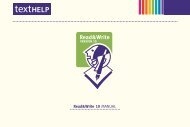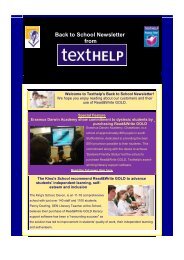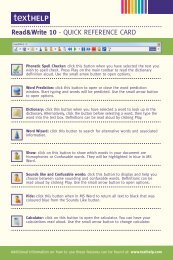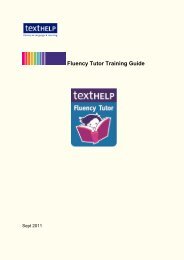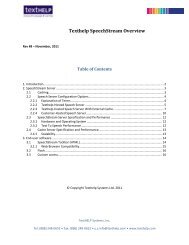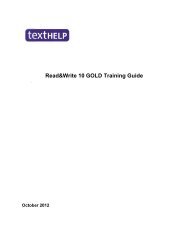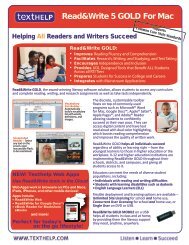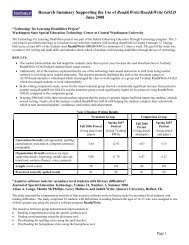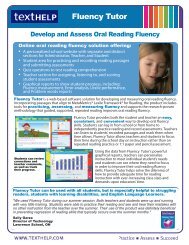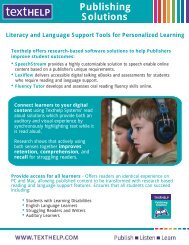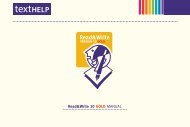01 NRDC Dyslexia 1-88 update - Texthelp
01 NRDC Dyslexia 1-88 update - Texthelp
01 NRDC Dyslexia 1-88 update - Texthelp
Create successful ePaper yourself
Turn your PDF publications into a flip-book with our unique Google optimized e-Paper software.
Developmental dyslexia in adults: a research review 143<br />
Learning to read calls upon many cognitive processes and involves many areas of the<br />
brain. A breakdown in any of the contributing processes or areas may thus lead to an<br />
inability to learn to read in the normal way. A difficulty in learning to read, or dyslexia,<br />
should not be viewed as a condition in itself, but as a symptom of a breakdown in one or<br />
more of the various processes involved (page 460).<br />
Maughan, B. and Yule, W. (1994). Reading and Other Learning Disabilities. In M. Rutter & E.<br />
Taylor & L. Hersov (Eds.), Child and Adolescent Psychiatry; modern approaches. Oxford:<br />
Blackwell Scientific Publications.<br />
There are two important respects in which the concept of dyslexia seems to be<br />
mistaken: firstly, the supposition that it is a distinct unitary condition; and secondly, that<br />
the presence of a biological condition means that environmental influences are<br />
unimportant. Quite the converse is true. Children with a biological impairment may be<br />
more vulnerable to environmental adversities and reading difficulties are best seen as<br />
the outcome of an interaction between constitutional deficits and environmental hazards<br />
(page 651).<br />
Badian, N. A. (1994). ‘Do dyslexic and other poor readers differ in reading-related cognitive<br />
skills?’ Reading and Writing: An Interdisciplinary Journal, 6, 45–63.<br />
… a significant weakness in word recognition and nonword reading accompanied by<br />
deficits in both orthographic and phonological processing, manifested as failure in<br />
automatic visual recognition and phonological recoding of graphic stimuli (page 61).<br />
Aaron, P. G. (1989). <strong>Dyslexia</strong> & Hyperlexia. Boston, MA: Kluwer Academic Publishers.<br />
… a form of reading disorder found in individuals who have average or superior listening<br />
comprehension but whose reading performance is compromised by deficient<br />
phonological skills (page 153).<br />
Thomson, M. E. (1989). Developmental <strong>Dyslexia</strong> (2nd ed.). London: Cole & Whurr.<br />
Developmental dyslexia is a severe difficulty with the written form of language<br />
independent of intellectual, cultural and emotional causation. It is characterised by the<br />
individual’s reading, writing and spelling attainments being well below the level expected<br />
based on intelligence and chronological age (page 3).<br />
Baddeley, A. D., Ellis, N. C., Miles, T. R. and Lewis, V. J. (1982). ‘Developmental and acquired<br />
dyslexia: a comparison’. Cognition, 11, 185–199.<br />
… a particular pattern of difficulties involving inconsistency between reading/spelling<br />
performance and intelligence level in the absence of sensory defects or primary<br />
emotional disturbance (page 187).<br />
Note 1 The ‘definition of dyslexia—poor reading in relation to intelligence—is out of line<br />
with traditional definitions’ (page <strong>88</strong>). Miles, T. R. (1996). Peer review commentary ‘Are<br />
dyslexics different? I & II’. <strong>Dyslexia</strong>, 2, 79–100.<br />
Note 2 ‘In line with traditional usage, only those picked out by the ‘imbalance’ criteria



